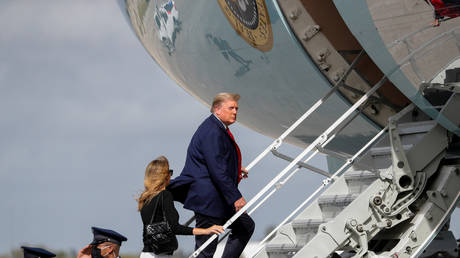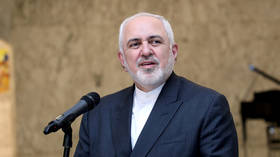
Days before the anniversary of General Qassem Soleimani’s assassination, Tehran has scoffed at a US media report of an alleged Iranian plot to ‘kill’ Donald Trump, arguing that political assassination is an American tactic.
The Washington Times ran a story claiming that Iranian President Hassan Rouhani had issued a death threat to the US leader, alleging that he boasted Trump would “soon be dead.”
The story was based on a speech Rouhani gave earlier this week in which he said that the world would soon be rid of “Trumpism” and that “this murderer’s mandate is drawing to an end and he will go down into the dustbin of history.”
A translation used by the Washington Times and other outlets made it appear that Rouhani was predicting that Trump’s own life would soon come to an end.
Responding to the Times’ report, Iranian Foreign Ministry spokesman Saeed Khatibzade strenuously denied that Tehran had Trump in its crosshairs.
“Cowardice in assassinating foreign leaders is a US-Israeli trademark; NOT Iranian,” the spokesman tweeted on Friday. He added that the Washington Times “should know better than to publish fake news & spread anti-Iran bigotry.”
Alireza Moezi, Iran’s deputy minister of communications for the office of the president, issued a similar rejection of the report, insisting that it was “beneath the dignity of [the] Iranian president to threaten the life of a foreign counterpart.” According to Moezi, Rouhani was clearly referring to Trump’s “political” life when he made his remarks.
The rebuke comes amid heightened tensions between the two rivals. January 3 will mark the one year anniversary of the US assassination of Soleimani, Iran’s Quds Force commander, who was killed along with Iraqi militia leaders in a drone strike near Baghdad International Airport. In retaliation, Iran launched a series of missile strikes on Iraqi bases housing US troops. However, Tehran has vowed further revenge for Soleimani’s killing, and the US has pulled some diplomatic staff and military units out of the region, reportedly as a precautionary measure.
Similar trouble is brewing between Iran and Israel. In November, an Iranian nuclear scientist, Mohsen Fakhrizadeh, was assassinated in a daylight ambush. Tehran claims Israel is responsible for the scientist’s killing, and that his murder was designed to provoke Iran into war. Israeli has so far declined to comment on the incident.
Iran has also expressed fears that Trump may attempt to start a conflict with the Islamic Republic before his term ends on January 20. Iranian Foreign Minister Mohammad Javad Zarif claimed on Thursday that Iraqi intelligence had revealed a US plot to “fabricate pretext for war” – possibly by staging a false-flag event.
Like this story? Share it with a friend!
Related posts:
Views: 0
 RSS Feed
RSS Feed

















 January 2nd, 2021
January 2nd, 2021  Awake Goy
Awake Goy 
 Posted in
Posted in  Tags:
Tags: 
















